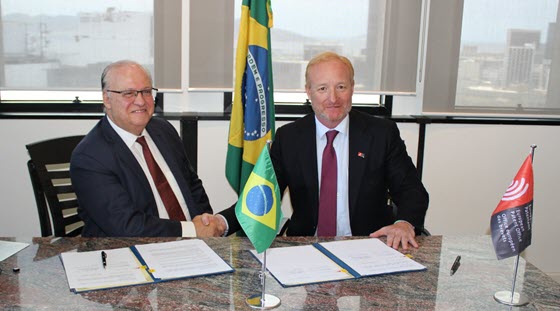The European Patent Office (EPO) and the National Institute of Industrial Property of Brazil (INPI) have signed a Memorandum of Understanding on a Reinforced Technical and Strategic Partnership to enhance co-operation between Europe and Brazil in the area of patents. The MoU was signed by EPO President António Campinos and INPI President Cláudio Vilar Furtado today in Rio de Janeiro.

The agreement between the EPO and Latin America's biggest patent office is aimed at strengthening the patent systems in Brazil and Europe in order to support innovation and economic development, and foster bilateral trade and investment between the two regions.
"Brazil is a key partner for the EPO and an important market for European companies," said EPO President Campinos."This agreement is a milestone in our co-operation and is testament to the economic importance of close ties between our regions. Our co-operation aims to ensure efficient patent examination and the granting of high-quality patents. It should thus benefit both local innovators and international patent applicants, who can increasingly expect to find similar conditions for protecting their inventions around the world."
INPI President, Cláudio Vilar Furtado, highlighted the importance of the agreement to stimulate investment in innovation and industrial property, focusing on the generation of new patents, especially in partnership. "In this agreement between INPI and EPO, Brazilians and Europeans are united as we recognise that patents are a central element of an innovation-driven business environment," he said.
At their meeting the two offices also signed an MoU to renew their Patent Prosecution Highway (PPH) pilot programme. The new PPH, which comes into effect on 1 December, will enable patent applicants to continue to request fast-tracking of their applications pending at both offices, and will be open to patent applications in all fields of technology.
Under the Reinforced Technical and Strategic Partnership agreement, the EPO and INPI will co-operate on strengthening local capacity in searching and examining patent applications through training and exchange of best practice, sharing tools, and exchanging patent data. In addition, when examining national patent applications corresponding to applications already processed by the EPO, the INPI will re-use EPO search reports in its own patent granting process, in order to further enhance quality and efficiency, and free up resources to support local innovation. Activities under the MoU will be based on a detailed two-year work programme agreed by both offices.
Brazil is the largest economy in Latin America and its trade with Europe accounts for over a third of the EU's total trade with the region. The EU is also the biggest foreign investor in Brazil with investments in many sectors of the Brazilian economy.
Co-operation between the EPO and INPI dates back to 2000 with the launch of a first technical co-operation project between the two offices. This was followed by a number of bilateral agreements enhancing co-operation to include granting the INPI access to EPOQUE Net (in 2005), co-operation on patent classification, with INPI deciding in 2013 to classify its patent publications in the Cooperative Patent Classification and, in 2017, a joint Patent Prosecution Highway pilot programme.
About Reinforced Partnership agreements
The EPO's Reinforced Partnership programme builds on the Office's technical co-operation and seeks to establish ambitious, long-term partnerships with intellectual property offices around the world in strategic and technical areas of mutual interest. It aims to further develop and strengthen the global patent system by extending the network of partner offices who systematically use EPO work products, tools and practices to increase the capacity, productivity and quality of the patent-grant process. The programme provides improved conditions for companies and inventors filing patents internationally, and fosters local innovation by supporting the partner offices in providing improved services to local applicants.
Source: European Patent Office (EPO) - https://www.epo.org/news-issues/news/2019/20191126.html





